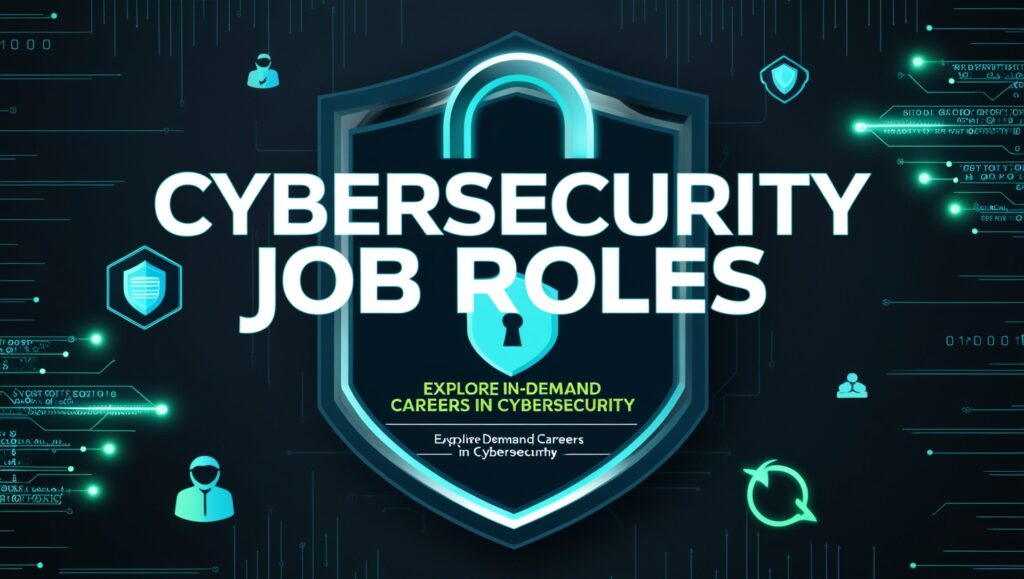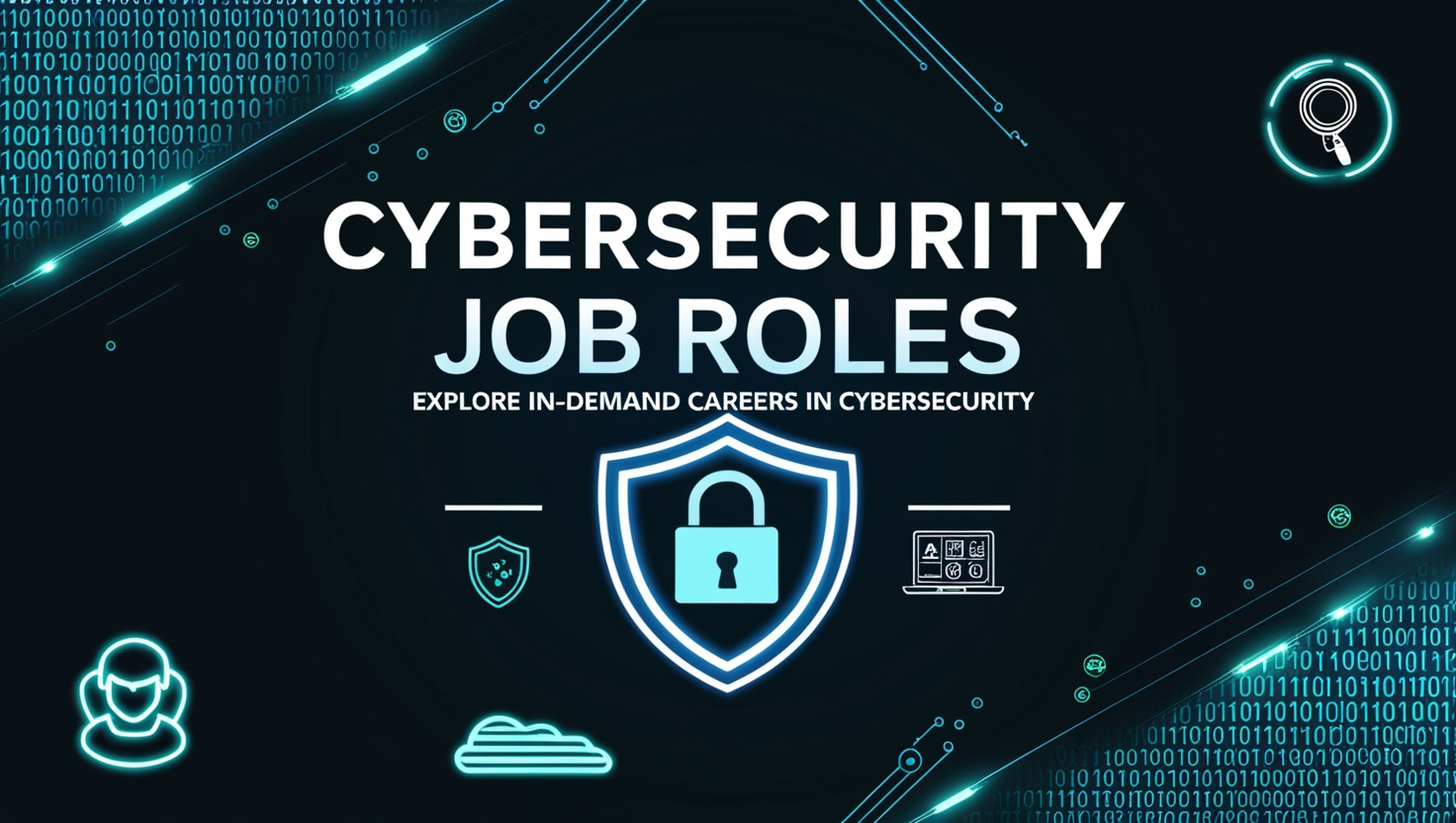In today’s digital age, Cybersecurity Job Roles are more critical than ever. With cyber threats evolving at an unprecedented pace, organizations are actively seeking skilled professionals to protect their data, systems, and networks. Whether you’re just starting your career or looking to advance in the field, understanding the various Cybersecurity Job Roles can help you navigate this dynamic and rewarding industry.
1. Introduction to Cybersecurity Careers
Cybersecurity is no longer just an IT concern—it’s a global priority. From safeguarding sensitive customer data to defending national infrastructure, Cybersecurity Job Roles span a wide range of responsibilities and industries. As cyberattacks become more sophisticated, the demand for skilled professionals continues to grow. In fact, the cybersecurity field is expected to see a 31% job growth rate by 2029, making it one of the fastest-growing career paths.
If you’re passionate about technology, problem-solving, and making a difference, a career in cybersecurity could be your calling. Let’s explore the top Cybersecurity Job Roles in demand today.
2. Top Cybersecurity Job Roles in Demand
The cybersecurity landscape is vast, with roles tailored to different skill levels and specializations. Here are some of the most sought-after Cybersecurity Job Roles:
- Cybersecurity Analyst: Monitors and protects an organization’s systems from threats.
- Penetration Tester (Ethical Hacker): Simulates cyberattacks to identify vulnerabilities.
- Security Architect: Designs and builds secure IT infrastructures.
- Incident Responder: Handles and mitigates security breaches in real-time.
- Chief Information Security Officer (CISO): Oversees an organization’s entire cybersecurity strategy.
These roles represent just the tip of the iceberg. Let’s break them down further based on experience levels.
3. Entry-Level Cybersecurity Roles
If you’re new to the field, entry-level Cybersecurity Job Roles are a great way to gain experience and build your skills. Some common roles include:
- Security Operations Center (SOC) Analyst: Monitors security alerts and responds to incidents.
- IT Auditor: Evaluates systems for compliance with security standards.
- Junior Penetration Tester: Assists in identifying vulnerabilities under supervision.
These roles often require foundational knowledge of networking, operating systems, and basic cybersecurity principles. Certifications like CompTIA Security+ or Certified Ethical Hacker (CEH) can give you a competitive edge.
4. Mid-Level Cybersecurity Roles
With a few years of experience, you can transition into mid-level Cybersecurity Job Roles that offer more responsibility and higher pay. Examples include:
- Security Engineer: Implements and manages security tools and technologies.
- Cybersecurity Consultant: Advises organizations on best practices for securing their systems.
- Threat Intelligence Analyst: Researches and analyzes emerging cyber threats.
Mid-level roles often require advanced technical skills, such as scripting, cloud security, and threat modeling.
5. Advanced-Level Cybersecurity Roles
For seasoned professionals, advanced Cybersecurity Job Roles offer leadership opportunities and the chance to shape an organization’s security strategy. These roles include:
- Security Architect: Designs robust security frameworks for large enterprises.
- Cybersecurity Manager/Director: Leads a team of security professionals.
- Chief Information Security Officer (CISO): Acts as the top executive responsible for cybersecurity.
These positions require extensive experience, strategic thinking, and often advanced certifications like CISSP or CISM.
6. Specialized Cybersecurity Roles
As cybersecurity evolves, specialized Cybersecurity Job Roles are emerging to address niche areas. Some examples include:
- Cloud Security Specialist: Focuses on securing cloud-based infrastructures.
- Digital Forensics Analyst: Investigates cybercrimes and data breaches.
- Identity and Access Management (IAM) Specialist: Manages user permissions and authentication systems.
These roles cater to specific industries or technologies, offering unique challenges and opportunities.
7. Skills Required for Cybersecurity Jobs
To succeed in Cybersecurity Job Roles, you’ll need a mix of technical and soft skills. Key skills include:
- Technical Skills: Networking, coding, encryption, and familiarity with tools like SIEM and firewalls.
- Soft Skills: Problem-solving, communication, and attention to detail.
- Certifications: Industry-recognized credentials like CISSP, CEH, and CompTIA Security+.
Continuous learning is essential, as cybersecurity is a field that never stands still.
8. How to Start a Career in Cybersecurity
Breaking into Cybersecurity Job Roles doesn’t always require a traditional degree. Here’s how to get started:
- Education: Pursue a degree in cybersecurity, IT, or a related field.
- Certifications: Earn entry-level certifications to build credibility.
- Hands-On Experience: Participate in internships, labs, or capture-the-flag (CTF) competitions.
- Networking: Join cybersecurity communities and attend industry events.
With dedication and the right approach, you can land your first role in this exciting field.
9. Challenges in Cybersecurity Careers
While Cybersecurity Job Roles are rewarding, they come with their own set of challenges:
- Evolving Threats: Staying ahead of constantly changing cyber threats.
- High-Stress Situations: Managing the pressure of responding to breaches.
- Skill Gaps: Keeping up with the latest technologies and techniques.
Despite these challenges, the impact you can make in this field is unparalleled.
10. Future Trends in Cybersecurity Job Roles
The future of Cybersecurity Job Roles is shaped by emerging technologies and trends, such as:
- AI and Machine Learning: Automating threat detection and response.
- Cloud Security: Protecting data in hybrid and multi-cloud environments.
- Privacy Regulations: Ensuring compliance with laws like GDPR and CCPA.
As these trends evolve, so will the opportunities for cybersecurity professionals.
11. Conclusion: Why Cybersecurity is a Rewarding Career Path
Cybersecurity Job Roles offer more than just job security—they provide the chance to make a real impact in a world increasingly reliant on technology. With competitive salaries, diverse career paths, and the opportunity to work in virtually any industry, cybersecurity is a field worth exploring.
12. FAQ Questions
Q1: What are the most in-demand Cybersecurity Job Roles?
A: Roles like Cybersecurity Analyst, Penetration Tester, and Security Architect are highly sought after.
Q2: Do I need a degree to start a career in cybersecurity?
A: While a degree helps, certifications and hands-on experience can also pave the way.
Q3: What certifications are best for Cybersecurity Job Roles?
A: Popular certifications include CISSP, CEH, and CompTIA Security+.


Leave a Reply